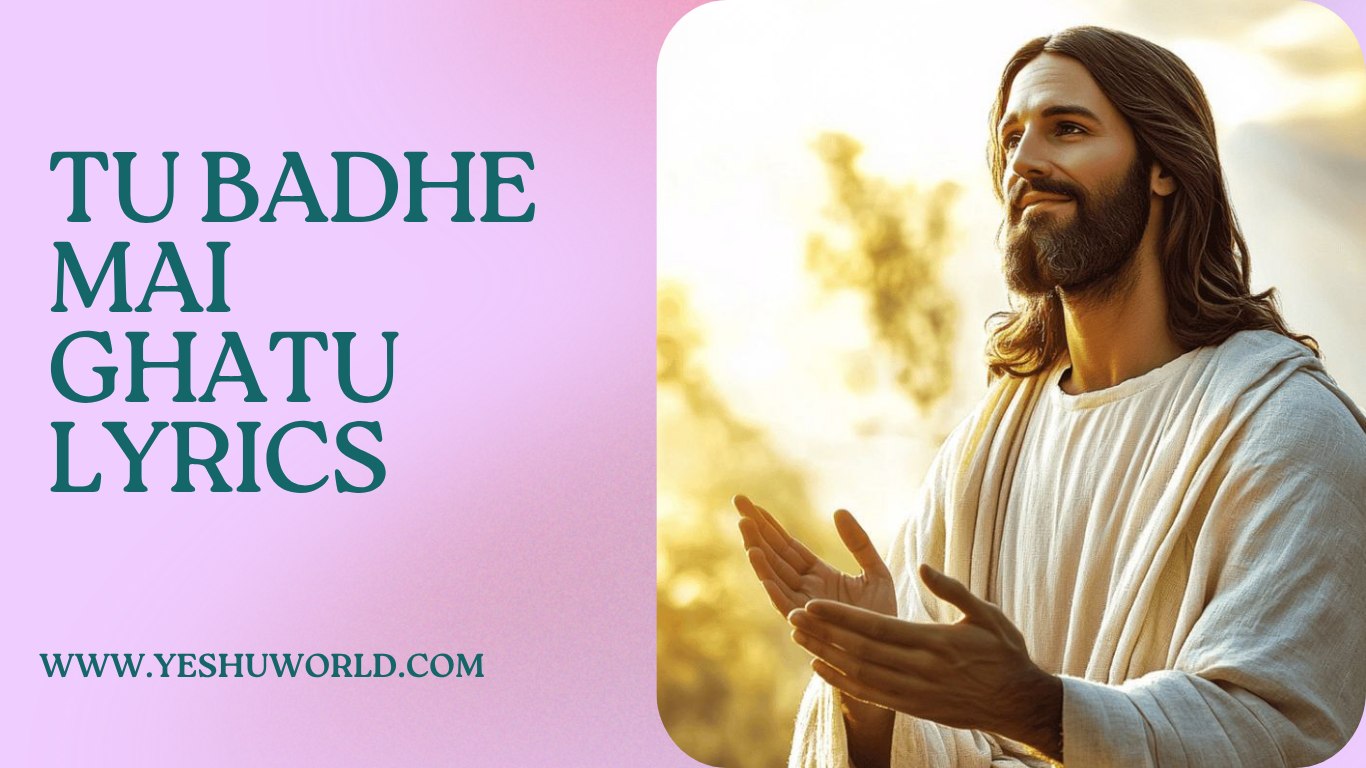Introduction: A Worshiper’s Cry – ‘You Increase, I Decrease’
“Tu bade, main ghatu” – translated as “You increase, I decrease” – is not just a worship lyric, it’s a powerful declaration of surrender. Inspired by John 3:30, where John the Baptist proclaims, “He must increase, but I must decrease,” this song captures the heart of every believer who longs to make Christ the center of their life.
In a world that constantly promotes self, the gospel calls us to self-denial and Christ-centeredness. This blog explores the deep spiritual meaning behind each line of the song, offering a devotional reflection for personal worship and deeper relationship with Jesus.
Lyrics
Tu bade main ghatu
Tere naam ke liye jiye hum
Tu bade main ghatu
Mere jeevan se mahima tujhe miley
Stutiyon ke beech mein
Viraajmaan prabhu
Tu bade aur main ghatu
Tu bade main ghatu
Yeshu naam mein hai changayii
Yeshu naam mein hai rihaayii
Yeshu naam mein hai bhalaayii
Yeshu naam mein hai sachhaii
Tu bade main ghatu
Mere jeevan se mahima tujhe miley
Tu mera hai mai tera hoon
Hai huda mere khuda
Mera jeevan tera khuda
Yeshu
Tu bade main ghatu
Also Read This Yeshu Aaja
1. Tu Bade, Main Ghatu – Let Christ Increase
“Tu bade main ghatu
Tere naam ke liye jiye hum
Tu bade main ghatu
Mere jeevan se mahima tujhe miley”
These lines echo the essence of the Christian journey – a daily denial of self and a growth in the likeness of Christ.
- “Tu bade” – You increase: This is a prayer of transformation. The more Christ increases in us, the more our selfish desires, pride, ego, and worldliness decrease.
- “Main ghatu” – I decrease: This means surrendering our will, our plans, and even our identity at the feet of Jesus so His glory may be revealed in and through us.
2. Worship in the Midst of Praise
“Stutiyon ke beech mein
Viraajmaan Prabhu”
(“You are enthroned amidst praises, O Lord.”)
This line reminds us of Psalm 22:3 – “But You are holy, enthroned in the praises of Israel.”
- In worship, God doesn’t just listen; He dwells.
- He doesn’t need a temple made by hands – He comes to the altar of surrendered hearts.
The more we praise, the more our hearts align with His presence. Worship is not just a song; it’s the environment where He reigns.
3. The Power in the Name of Jesus
“Yeshu naam mein hai changayi
Yeshu naam mein hai rihaayi
Yeshu naam mein hai bhalaayi
Yeshu naam mein hai sachchaii”
Each of these declarations reveals a specific attribute of Jesus’ name:
- Healing (Changayi): The name of Jesus still heals – physically, emotionally, and spiritually. Isaiah 53:5 – “By His wounds we are healed.”
- Freedom (Rihaayi): Where the Spirit of the Lord is, there is liberty (2 Corinthians 3:17). He breaks chains of sin, fear, and addiction.
- Goodness (Bhalaayi): Psalm 34:8 says, “Taste and see that the Lord is good.” Jesus is not just good in nature – He is the very source of goodness.
- Truth (Sachchaii): Jesus declared, “I am the Way, the Truth, and the Life” (John 14:6). His name represents reality, clarity, and direction.
In a world filled with chaos and confusion, the name of Jesus becomes our anchor. This part of the song invites us to declare His power over every area of life.
4. A Life Lived for His Glory
“Mere jeevan se mahima tujhe miley”
(“Let You receive glory through my life.”)
It echoes Jesus’ prayer in John 17:4:
“I have brought you glory on earth by finishing the work you gave.
5. Identity in Christ
“Tu mera hai, main tera hoon
Hai Huda mere Khuda
Mera jeevan tera Khuda
Yeshu”
These lines bring the worship into the most intimate realm – identity and relationship.
- “Tu mera hai, main tera hoon” – This is covenant language. It mirrors Song of Songs 6:3 – “I am my beloved’s, and my beloved is mine.”
- “Hai Huda mere Khuda” – “You are my Lord and my God” – a confession of personal relationship with the Almighty.
- “Mera jeevan tera Khuda” – “My life belongs to You” – a surrender of control, purpose, and future.
This part of the song is a beautiful reminder that faith in Christ is not religion, it’s relationship. One where we belong to Him – body, soul, and spirit.
6. Repeating the Heartcry: You Increase, I Decrease
“Tu bade main ghatu” (Refrain)
The repetition of this line throughout the song serves as a reminder:
- It’s not a one-time prayer, but a daily surrender.
- As we grow spiritually, this becomes more real: He must increase in my thoughts, my choices, my actions… and I must decrease.
The beauty of Christianity is not that we become more of ourselves, but more like Christ.
Galatians 2:20 summarizes it perfectly:
“I have been crucified with Christ.
Final Thoughts: Living a Life That Echoes ‘Tu Bade’
It reminds us that we are not the center of our own universe – Jesus is.
To truly say “You increase, I decrease” means:
- We stop living for applause and start living for an audience of One.
- We abandon our self-image and embrace our identity in Christ.
- We surrender our plans and trust His perfect will.
Closing Prayer:
Lord Jesus, I come to You with a humble heart. I lay down my pride, my plans, and my need for control. Let Your presence increase in my life. Let my words, thoughts, and actions bring You glory. I belong to You – take all of me, and be glorified through me. Amen.

